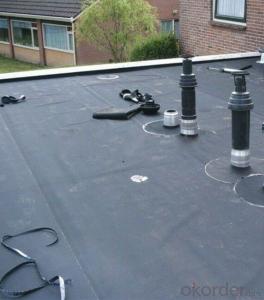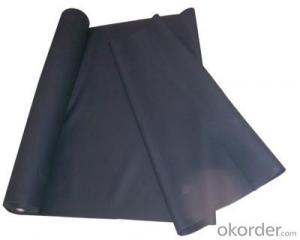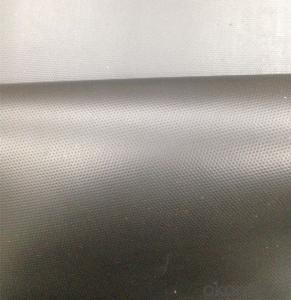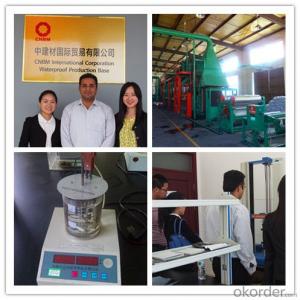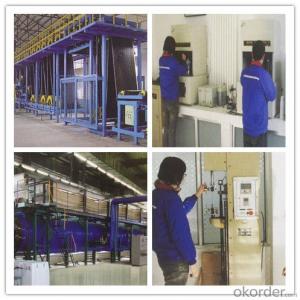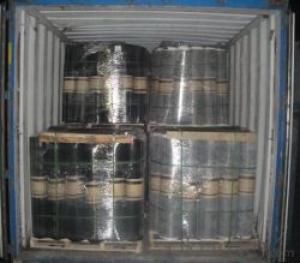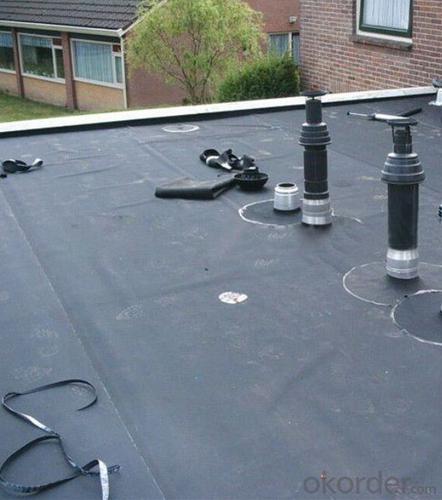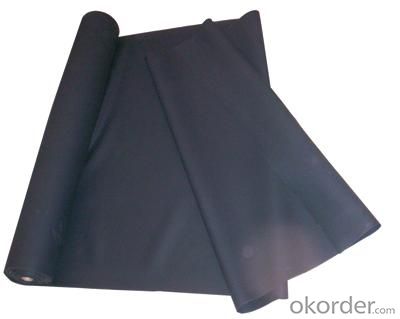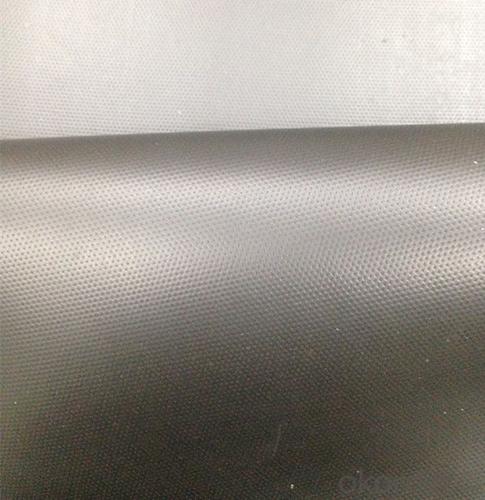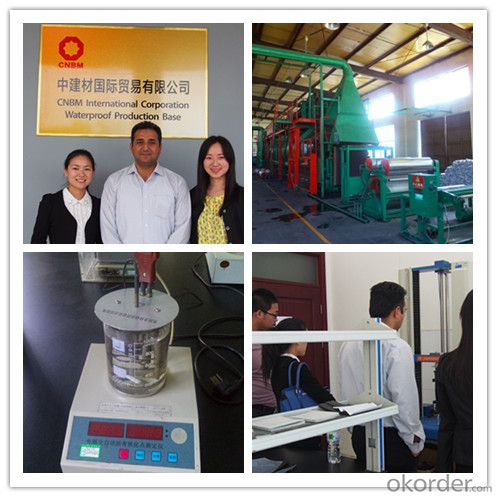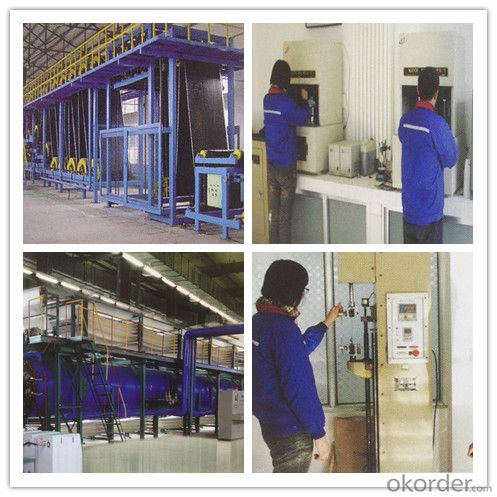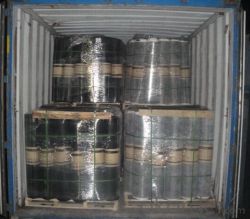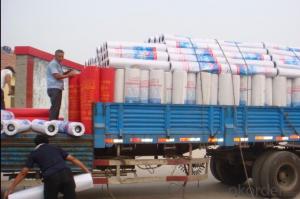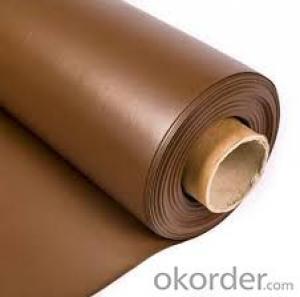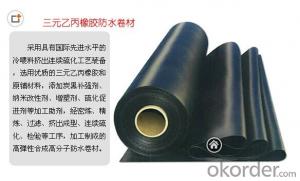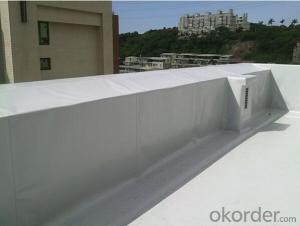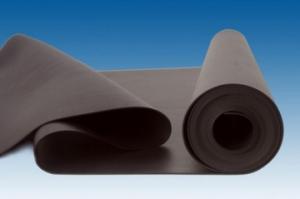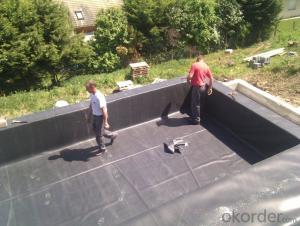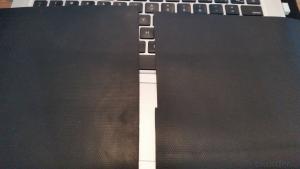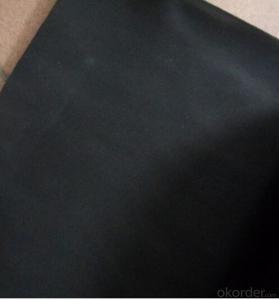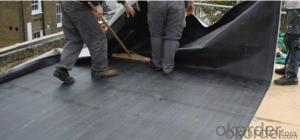EPDM Waterproof Rubber Membrane for Roof Basement Pond Liner
- Loading Port:
- Qingdao
- Payment Terms:
- TT or LC
- Min Order Qty:
- 3100 m²
- Supply Capability:
- 200000 m²/month
OKorder Service Pledge
OKorder Financial Service
You Might Also Like
EPDM Rubber Waterproof Membrane for Roof Basement Pond Liner
Instruction for EPDM Membrane:
EPDM waterproof membrane is made from ternary ethylene-propylene rubber,which is designed for waterproofing of exposed and non-exposed applications. EPDM waterproof membrane is of high elasticity among high polymer waterproof materials and becomes a world-popular waterproofing material.
CNBM own the wold-advanced equipment of cold feeding extrusion and continuous vulcanization technology. With the best performance among high polymer waterproof materials, EPDM is of exceptional elasticity and will not split or cracked under normal building movement.
EPDM Membrane Features:
1. Great tensile strength,long-range elasticity and aging resistant.
2. Excellent heat reisistant and can be used under -70°C~~+110°C .
3.Good anti-corrosion, ultraviolet resistant, root penetration resistance
4.Long life use over 50 years and used longer 100 years or more under the condition of buried in the ground.
5.Light and easy to install.
EPDM Membrane Applications:
1,Roofs, Basement, Toilet
2,Industrial and civil building waterproofing
3,Geosynthetic liner for swimming pool, channels, irrigation system
4,Especially suit for projects with high requirements in durability, anti-corrosion anddeformation
EPDM Membrane Specifications:
-Width of roll: 1.2m, 2m, 4m
-Length of roll: 20m, 30m or customized
-Thickness of membrane: 1.2mm, 1.5mm, 2mm
-Type: vulcanized EPDM or welding EPDM
EPDM Membrane Technology Data:
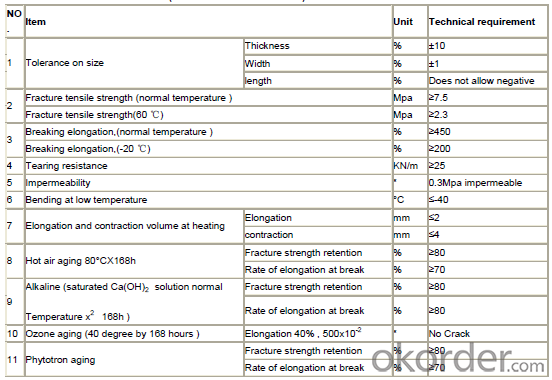
FAQ:
1. Is your EPDM waterproof membrane the real rubber?
Yes, our EPDM membrane is made from top quality rubber, which is imported from America. We support samples for testing, or testing in our factory.
2. How's your products quality?
Our EPDM is with the top quality at home and abroad. Our quality is much higher than Chinese standard. Our product is widely used in Chinese Central government projects. And it's also accpted by customers all over the world, such as EU, USA, Astrulia, etc.
3. What's the service life of your EPDM membrane?
The service life of our EPDM membrane is more than 50 years.
4.What's your MOQ?
Our MOQ is 3000M2.
5. What's your product ability of EPDM membrane?
We own the largest EPDM production line in China. Our product ability of EPDM membrane reaches 2 million square meter per year.
EPDM Membrane and Factory Photos:
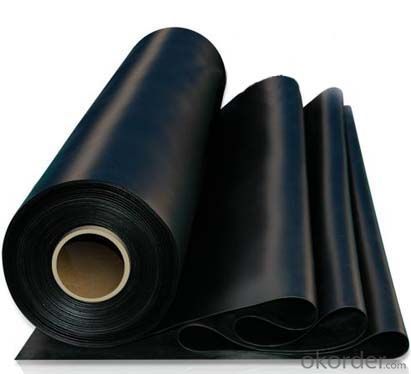
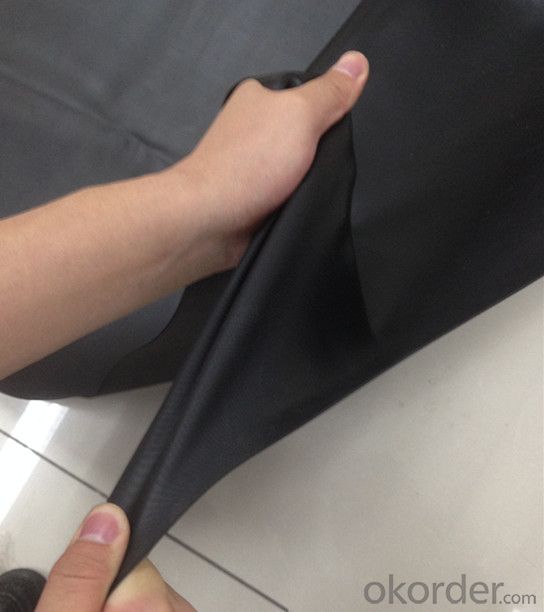
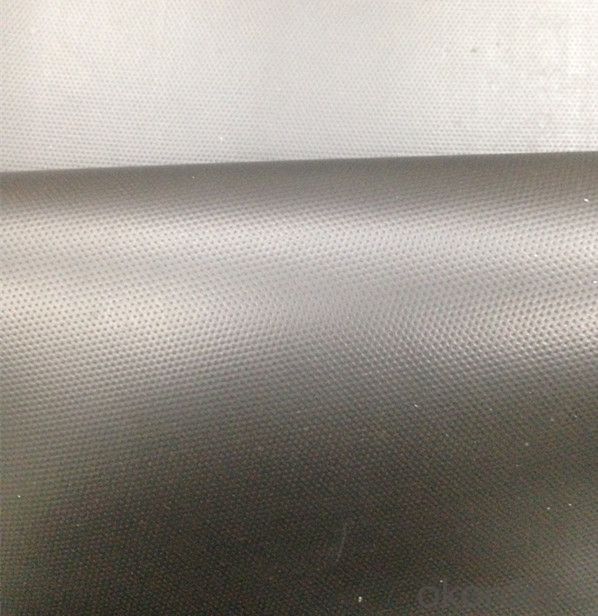
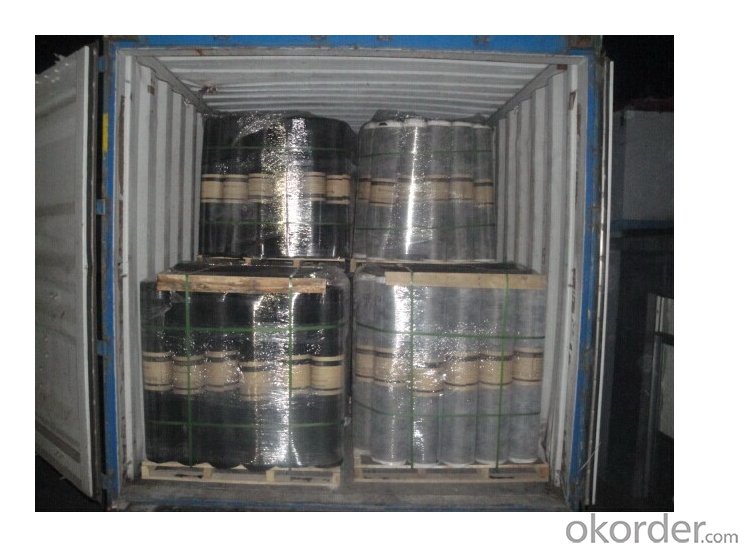
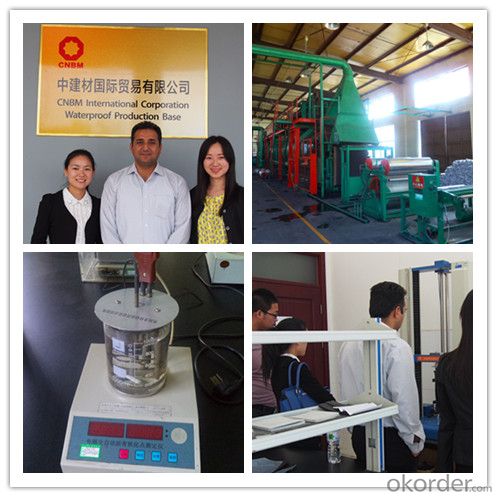
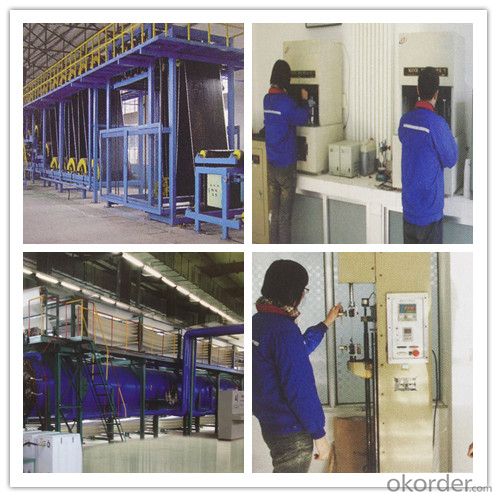
- Q: Can a waterproofing membrane be used for a basement floor?
- Yes, a waterproofing membrane can be used for a basement floor.
- Q: Are waterproofing membranes resistant to mineral oils?
- The resistance of waterproofing membranes to mineral oils can differ. Certain membranes are purposely engineered to withstand mineral oils, while others may not possess this capability. To ascertain the resistance level of a specific waterproofing membrane to mineral oils, it is crucial to review the manufacturer's specifications and product details. Moreover, seeking advice from a professional or directly contacting the manufacturer is advised to obtain tailored guidance regarding the compatibility of a waterproofing membrane with mineral oils in your unique scenario.
- Q: Are waterproofing membranes suitable for commercial applications?
- Indeed, waterproofing membranes prove to be a fitting choice for commercial applications. Specifically designed to safeguard buildings, structures, and surfaces from water infiltration, moisture damage, and similar issues, waterproofing membranes are frequently employed in diverse commercial scenarios such as roofs, basements, underground parking garages, and exterior walls. Commercial structures face a wide array of weather conditions and water sources, encompassing rainfall, snowfall, and groundwater. Waterproofing membranes serve as a dependable barrier, effectively preventing water penetration and averting costly water-related harm. Furthermore, they serve as a vapor barrier, mitigating moisture accumulation and condensation within the building envelope, which may otherwise lead to mold growth and structural decay. Waterproofing membranes are obtainable in various materials including bitumen, modified bitumen, EPDM, PVC, and TPO. Each material boasts distinct advantages and characteristics, allowing for flexibility in choosing the most appropriate option for specific commercial applications. They can be applied as liquid coatings, sheets, or panels, providing versatility in terms of installation methods to accommodate diverse building designs and requirements. Moreover, waterproofing membranes can be tailored to cater to specific commercial needs such as fire resistance, UV protection, and durability. This renders them highly effective in safeguarding commercial properties that may be subjected to heavy foot traffic, mechanical equipment, or other potential sources of damage. To summarize, waterproofing membranes prove to be an exceptionally suitable solution for commercial applications. They offer reliable protection against water infiltration, moisture damage, and related issues, ensuring the longevity and structural soundness of commercial buildings. Their versatility, customizable options, and ability to withstand various weather conditions make them an outstanding choice for commercial waterproofing requirements.
- Q: Can waterproofing membranes be used on shower walls?
- Yes, waterproofing membranes can be used on shower walls. These membranes are specifically designed to create a barrier against water, preventing leaks and protecting the underlying structure from moisture damage. Applying waterproofing membranes on shower walls is a common practice to ensure a watertight and durable shower enclosure.
- Q: Can a waterproofing membrane be used for an underground structure?
- An underground structure can indeed benefit from the use of a waterproofing membrane. Essentially, this membrane acts as a protective barrier, safeguarding the structure against water infiltration. It is commonly employed on various areas, including roofs, basements, and other regions prone to water seepage. When utilized in an underground structure, like a basement or foundation, the waterproofing membrane serves as a shield, obstructing any water present in the surrounding soil or groundwater. Its primary function is to prevent water seepage, which has the potential to inflict harm on the structure and give rise to issues such as mold growth or structural deterioration. To achieve a watertight seal, the waterproofing membrane is typically applied to the exterior walls and foundation of the underground structure. Choosing a high-quality membrane that is specifically designed for underground use and adheres to industry standards is of utmost importance. Furthermore, proper installation techniques, such as surface preparation and sealing of seams, are critical in ensuring the effectiveness of the waterproofing membrane in an underground structure.
- Q: Can a waterproofing membrane be used on concrete walls?
- Yes, a waterproofing membrane can be used on concrete walls. Waterproofing membranes are designed to provide a protective barrier against water penetration, and they can be applied to various surfaces including concrete walls. These membranes are typically made of materials such as modified bitumen, rubberized asphalt, or synthetic polymers, which are highly resistant to water and moisture. Applying a waterproofing membrane on concrete walls can effectively prevent water seepage, dampness, and potential damage caused by water infiltration. The membrane acts as a barrier, preventing water from permeating through the concrete and reaching the interior spaces. It also helps to maintain the structural integrity of the concrete by minimizing the risks of cracks, efflorescence, and other forms of moisture-related deterioration. There are different types of waterproofing membranes available in the market, such as sheet membranes, liquid membranes, and cementitious coatings. The choice of the membrane depends on factors such as the specific application, the degree of water exposure, and the condition of the concrete wall. It is essential to select a membrane that is compatible with the concrete and provides long-lasting waterproofing protection. Before applying the membrane, it is crucial to prepare the concrete surface properly. This may involve cleaning, repairing any cracks or imperfections, and ensuring that the surface is dry and free from any contaminants. The membrane is then installed according to the manufacturer's instructions, typically by adhering it to the concrete or by applying a liquid membrane using a brush or roller. In conclusion, a waterproofing membrane can be used on concrete walls to effectively protect them from water infiltration. This can help to maintain the durability and longevity of the concrete, as well as prevent potential water damage to the interior spaces. However, it is essential to choose the right type of membrane and follow proper installation procedures for optimal results.
- Q: Are waterproofing membranes suitable for indoor applications?
- Indeed, indoor applications are well-suited for waterproofing membranes. Specifically engineered to obstruct water infiltration and moisture accumulation, these membranes provide an excellent remedy for spaces vulnerable to water-induced harm, like basements, bathrooms, and kitchens. By establishing a barrier, they effectively shield the structure from water-related problems such as mold, decay, and structural deterioration, ensuring that water does not permeate floors, walls, or other surfaces. Moreover, in addition to their protective qualities, waterproofing membranes aid in regulating humidity levels, resulting in a more pleasant and healthful indoor atmosphere.
- Q: Can a waterproofing membrane be used in showers and wet areas?
- Certainly, one can indeed utilize a waterproofing membrane in showers and areas prone to moisture. In actuality, it is highly advisable to incorporate a waterproofing membrane in these regions as a means of averting water harm and leaks. The waterproofing membrane functions as a barrier between the tile or flooring and the underlying floor, guaranteeing containment and channeling of any water that infiltrates the surface towards the drains. This ensures preservation of the foundational structure by preventing moisture-induced damage like decay or mold proliferation. Moreover, a waterproofing membrane also serves to mitigate the risk of water seepage into nearby spaces and inducing harm to adjacent walls or floors. It is of utmost importance to ensure accurate installation of the waterproofing membrane, diligently sealing all seams, corners, and penetrations to achieve the desired level of waterproofing.
- Q: Can a waterproofing membrane be used in residential construction?
- Residential construction can indeed utilize a waterproofing membrane. These membranes find common usage in different parts of a residential property, such as roofs, basements, bathrooms, and foundations. Their purpose is to prevent water from penetrating and causing damage due to moisture. By opting for a waterproofing membrane, homeowners can ensure that their property remains dry and free from water leaks. This is crucial because such leaks can result in mold growth, structural deterioration, and other costly problems. The market offers a variety of waterproofing membranes, such as sheet membranes, liquid membranes, and self-adhering membranes, each with its own advantages and suitability for specific applications. Consulting with a professional contractor or architect can assist in determining the most suitable waterproofing membrane for a particular residential construction project.
- Q: Can a waterproofing membrane be used for roofing applications?
- Yes, a waterproofing membrane can be used for roofing applications. Waterproofing membranes are specifically designed to prevent water infiltration, making them ideal for protecting roofs from leaks and water damage. They provide a durable and effective barrier against moisture, ensuring the roof remains watertight.
Send your message to us
EPDM Waterproof Rubber Membrane for Roof Basement Pond Liner
- Loading Port:
- Qingdao
- Payment Terms:
- TT or LC
- Min Order Qty:
- 3100 m²
- Supply Capability:
- 200000 m²/month
OKorder Service Pledge
OKorder Financial Service
Similar products
Hot products
Hot Searches
Related keywords
